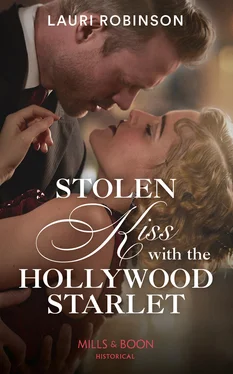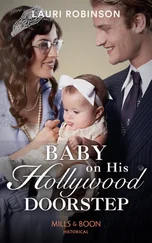“Would you care for a piece of cake and a cup of coffee?” Mrs. McCaffrey asked, returning to the dining room.
“No, thank you.” He stood. “I have some work to finish.”
She pulled the serving spoon out of the potatoes and waved it at him. “You shouldn’t work so much. It’s not good for the soul.”
“Someday I won’t,” he said, just to placate her. In all honesty, there was nothing else for him to do. It was a good thing that his clients kept him busy. In more ways than one. Being a lawyer for the rich and famous was a time-consuming job, but also one that had created a bank account that was far beyond what he’d ever have imagined.
Money hadn’t been the reason he’d gone into this profession, but he certainly couldn’t complain over how profitable it had become.
He strolled out of the dining room and down the hall to his home office. The house was big, five bedrooms upstairs, and one downstairs—a suite of rooms—off the kitchen, which was where Mrs. McCaffrey lived. There were other rooms on the main floor, but other than the dining room and his office, he rarely entered them.
There had been a time when he’d imagined this house full of children. A family. A real family. That’s what he’d wanted. Why he’d bought this house. A family like the one he’d had before he’d become an orphan at the age of ten.
That had been eighteen years ago now. He could barely remember what his parents had looked like, but he remembered that they’d loved him. And his little brother, Owen. He remembered the storm, too, and the flash flood. Parts of it. Especially being so cold that he didn’t think he would ever warm up.
It had been that way at the orphanage, too. Cold. Bitterly cold. A few months before he’d turned sixteen, he and Theodore Grahams had decided they’d had enough of being cold, and enough of being farmed out as day laborers to people who expected orphans to work harder than anyone else, so they’d escaped. Hopped on a train, and rode it to the end of the rails.
That happened to be California, and that suited them both just fine.
They’d found work on the docks, and thought their futures were as bright as the sunshine. It had been, for a few months. Until Theodore, big for his age, got in a fight with another dockworker. A serious fight that changed both of their lives. The other dockworker died, drowned, and Theodore was charged with his death.
Walter argued it was self-defense when Theodore was arrested, only to be told to shut up or he’d be arrested, too. He hadn’t been about to shut up, and went to the police station, still arguing, trying to prove Theodore’s innocence. He was kicked out several times, and finally went to a lawyer, hoping for help.
Arthur Marlow hadn’t been willing to take on the case, not at first, but Walter hadn’t given up. He and Theodore had been as close as brothers, and he’d had to help him. Had to. With no money to pay the attorney, Walter begged Marlow to let him work off the fees to represent Theodore. Arthur eventually agreed and Walter had thought everything would work out perfectly.
It hadn’t.
The jangle of the phone pulled Walter out of the past. He entered his office and crossed the room.
Hope. That’s what that girl from Nebraska said she had. He’d had that once, too. So had Theodore.
Picking up the phone, Walter held the receiver to his ear and the mouthpiece to his mouth. “Hello.”
“Walter? Walter, that you?”
Instantly recognizing Sam Wharton’s voice, Walter answered, “Yes, Sam, it’s me. How are you this evening?”
“Good. Real good. I’m down at CB’s, and Tony Ebbert and I need some legal advice. Can you drive over here?”
Sam had been a client for years; the money he’d paid for assistance on business deals had nearly paid for Walter’s house.
Walter considered the request for a moment. Normally, he’d suggest a meeting in his office tomorrow, but an evening out could be exactly what he needed to get his mind off other things, including that girl from Nebraska, and on to things that mattered. “Sure, Sam. I’ll be there shortly.”
“Hee-haw!” Sam replied with his signature statement. “See you soon!”
Cartwright’s Basement would never be his first choice to visit. Known as CB’s, it was downtown, in the basement of the ten-story Cartwright building. The main level was a grocery store, the upper levels apartments, including a floor where the girls who worked at CB’s lived and used for alternate activities.
There were too many speakeasies like CB’s within the city to count and Walter had figured out long ago that some things a person just had to accept. Like them or not.
He grabbed his suitcoat, told Mrs. McCaffrey he was going out and walked out the back door and to the garage.
After opening the wide double doors, he climbed in the car and hit the ignition. The engine roared to life with so much power the seat shook. The car was a luxury. There hadn’t been anything wrong with his old one, except that he’d wanted a new one, and getting it had been easy, unlike some of the other things he’d wanted. Still wanted but continued to tell himself that he didn’t.
He backed the car out and onto the road, then grinned as he shifted into First and laid his foot on the gas pedal. The roadster was a dream to drive.
Morning, noon or night, traffic always rolled up and down the streets downtown, and Walter had to circle the block before he found a place to park. He climbed out, then took the sidewalk to the alley, where the entrance to CB’s was located.
The joint might be in the basement, but their secret had long been released. Everyone, including the police, knew where it was located and what went on in there, as well as hundreds of other places. In fact, there were just as many laws on the city books to protect the speakeasy owners as there were against prohibition. Federal agents didn’t have a hope in hell of upholding the laws Congress had passed.
Cigarette and cigar smoke swirled up the steps as he walked down them, and music echoed off the walls, as did joyous laughter and the murmur of conversations.
He entered the long and wide room full of tables and an elaborately carved wooden bar that ran the entire length of the back wall. A band played music at the far end, where people danced, and cigarette girls sashayed around the tables, wearing tight, short red dresses and carrying more than packs of cigarettes in the white wooden trays hooked around their necks with thick white straps.
Walter scanned the chairs, looking for Sam and Tony. He and Sam noticed each other at the same time. Sam stood, waved one of his long and gangly arms. Where he found shirts with sleeves that long had been the topic of more than one conversation.
Weaving his way toward Sam, Walter nodded and said hello to numerous people at various other tables. Some he knew well, others were mere acquaintances, and a few, he wouldn’t mind never seeing again.
“Hey, Walter. I ordered you a drink,” Sam said, his straw-colored hair sticking out from beneath the rim of his flat tweed hat. “The good stuff. Have a seat. You know Tony.”
“Thanks.” Walter took a seat and nodded at Tony. A redheaded heavyweight champion boxer who had a good chance at the world title this year. “Good seeing you, Tony. Congrats. Hear this could be your year.”
“It sure could,” Tony replied with a voice so low it had to come from the depths of his stomach.
The conversation bounced from boxing to cars, to the latest rumors, including who had financed the building of the new theater, and back to boxing. Walter had finished his drink during that time, and enjoying the camaraderie, he reached out to snag a cigarette girl so he could order another drink.
Читать дальше












